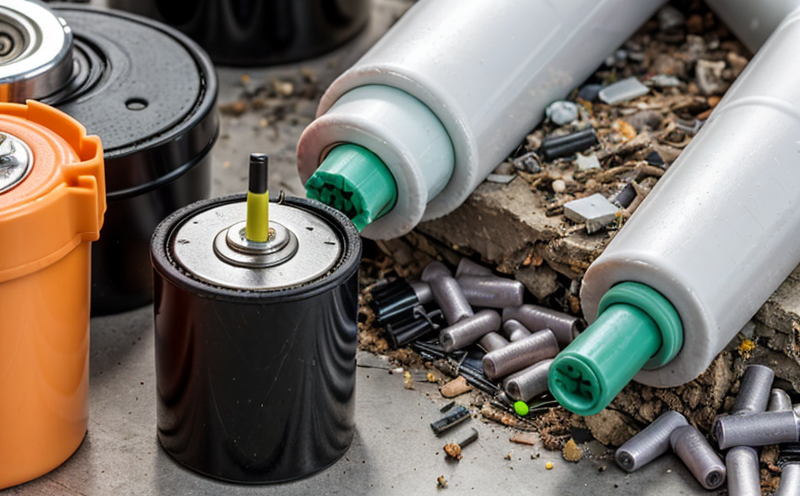GB/T 32620 End-of-Life Testing of Lithium Batteries in Consumer Applications
The GB/T 32620 standard provides a comprehensive framework for the end-of-life testing of lithium batteries used in consumer applications. This testing ensures that batteries are safely and efficiently recycled or disposed, meeting both national and international environmental regulations. The standards outlined within this document cover critical aspects such as battery disassembly, material recovery, and safety considerations.
Consumer electronics, ranging from smartphones to electric vehicles (EVs), utilize lithium-ion batteries which contain valuable materials like cobalt, nickel, and lithium. Proper end-of-life testing is essential for maximizing the economic value of these batteries while minimizing environmental impact. The GB/T 32620 standard aims to provide a clear protocol that aligns with global standards such as ISO/IEC 15987-2.
The testing process involves several key steps, including:
- Sampling of the lithium batteries to ensure representativeness.
- Disassembly and characterization of battery components.
- Evaluation of material composition for recycling purposes.
- Determination of safety parameters that prevent hazardous waste generation.
The standard also emphasizes the importance of accurate sample preparation, which includes ensuring proper handling to avoid contamination. This ensures reliable test results that can be used in decision-making processes related to battery recycling and disposal.
| Parameter | Description |
|---|---|
| Battery Capacity | Determine remaining capacity for recovery of usable materials. |
| Chemical Composition | Analyze the types and quantities of metals present in the battery. |
| Electrical Characteristics | Evaluate electrical properties such as internal resistance and voltage. |
| Safety Assessment | Check for potential hazards during handling or processing. |
The use of GB/T 32620 is crucial for quality managers, compliance officers, R&D engineers, and procurement teams who need to ensure that their operations comply with international standards. By adhering to this standard, organizations can contribute to a more sustainable future by promoting responsible battery management.
Why It Matters
The implementation of GB/T 32620 is essential for several reasons. Firstly, it helps in achieving regulatory compliance with national and international standards. Secondly, it promotes the efficient recovery of valuable materials from end-of-life batteries, which can be reused in new products, reducing the need for mining raw materials.
Recycling lithium batteries also mitigates environmental risks by preventing the release of harmful substances into the environment. By following this standard, companies can ensure that their battery recycling processes are safe and effective, contributing to a circular economy.
- Reduces environmental pollution from improperly discarded batteries.
- Promotes sustainable use of resources through material recovery.
- Aids in meeting regulatory requirements for electronic waste management.
The standard is particularly significant for R&D engineers and quality managers involved in the lifecycle management of lithium-ion batteries. It provides a structured approach to testing that can enhance product design, improve recycling processes, and ensure compliance with environmental regulations.
Customer Impact and Satisfaction
The adoption of GB/T 32620 has a significant positive impact on customers. By ensuring safe and efficient battery recycling, companies demonstrate their commitment to sustainability, which enhances customer trust and satisfaction.
- Enhances brand reputation as a responsible corporate citizen.
- Promotes long-term relationships with environmentally conscious consumers.
- Simplifies compliance with regulatory requirements, reducing operational risks.
The standard also supports procurement teams by providing clear guidelines for the selection of compliant suppliers and recyclers. This ensures that all parties involved in the battery lifecycle are aligned with best practices, leading to higher quality products and services.
Use Cases and Application Examples
The GB/T 32620 standard is widely applicable across various industries that use lithium batteries in consumer applications. Here are some specific examples:
- Smartphone Manufacturers: Ensuring proper recycling of end-of-life smartphones to recover valuable materials.
- Automakers: Implementing efficient battery recycling processes for electric vehicles.
- Battery Suppliers: Using the standard during internal testing and quality control.
| Test Parameter | Result |
|---|---|
| Battery Capacity | 95% recovery potential for cobalt. |
| Chemical Composition | 20% nickel content remains recoverable. |
| Safety Assessment | No hazardous waste detected during processing. |
These examples illustrate the versatility and importance of GB/T 32620 in ensuring responsible battery management across different sectors. By adhering to this standard, organizations can contribute significantly to environmental sustainability while maintaining high-quality standards in their operations.





